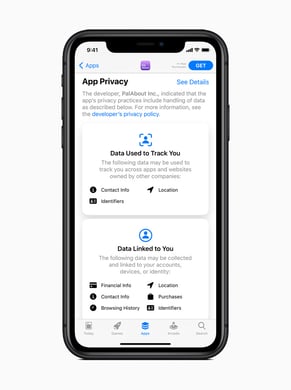Facebook and Apple are going head-to-head as the fight to weigh consumer data privacy with personalized advertising services continues.
In August 2020, Apple announced a big update to their mobile operating system: iOS 14. The update aims to address growing privacy concerns among the general population and new data regulations going into effect.
iOS 14 was slated to roll out policies that would give individuals more control over the data they share with Apps. Almost immediately after the announcement, there was growing concern over the impact the update would have on advertisers – specifically those using Facebook and Instagram.
Now that the iOS 14.5 update has begun to roll these restrictions out to iPhone owners, we wanted to update you on:
- The policies iOS 14 will put into place
- The impact they will have on reporting for Facebook
- What that means for your nonprofit’s digital media programs
New policies implemented in iOS 14 update
Apple’s iOS 14 update has three new policies that will disrupt and limit a nonprofit’s ability to effectively use personalized advertising. These include:
 Data Nutrition Labels: All App Store apps must submit information about their data collection practices to Apple.
Data Nutrition Labels: All App Store apps must submit information about their data collection practices to Apple.
Tracking Transparency Prompt: All apps must ask users for permission to track them across third-party apps and websites.
Tracking via App/Browser APIs: Facebook and other platforms will use framework that restricts, aggregates and delays event reporting.
Apple is also introducing Private Click Measurement (PCM) which will restrict data that can be shared across businesses and platforms. PCM will not support app-to-web conversion tracking or cross domain measurement.
What this means for Facebook advertising
While the update does not seem to impact paid search and display advertising, iOS 14 will have an impact on reporting for Facebook and Instagram ads.
In response, Facebook has created their own solution, called Aggregated Event Measurement (AEM). This solution will limit the transmission of data while still supporting the critical advertiser functions marketers use to keep digital fundraising campaigns up and running.
AEM will support app-to-web conversion tracking, enable flexibility for other platform privacy and show Facebook and Instagram app users a pre-prompt detailing what the Apple prompt refers to for their channels.
However, it’s important to note that advertisers will still lose functionality with AEM. With AEM in place, advertisers will only be allowed to optimize and report on 8 events per domain. Advertisers will also have to verify the domain associated with these 8 events.
It’s also important to note that only one Facebook Business Manager can verify a domain, so if your organization uses more than one agency or runs Facebook campaigns in-house, you will need to coordinate with your partners.
All campaigns optimizing toward events outside of the 8-event cap will be paused now that this update is rolling out.
How to verify a domain
There are three ways to verify your domain:
- Add a DNS TXT entry to your DNS record to confirm that you own the domain
- Upload an HTML file provided by Facebook to your web directory and confirm domain ownership in Business Manager
- Add a meta tag to the <head> section of your domain home page
Facebook has created a resource to help walk you through this process.
The impact for nonprofits
Decrease in custom audiences
Nonprofits can expect to see decreases in custom audience sizes due to event limitations. For example, if “users who have donated in 30 days” is no longer one of your events, donors who have made a gift in the past 30 days could end up in your targeting efforts. Because of this, Facebook recommends shifting to broader audience targeting efforts.
Decline in measurement capabilities
Nonprofits can also expect to see a significant decrease in measurement. Reported conversions are expected to decline in volume due to the limitations and restrictions that will be placed around visibility.
Changes to attribution windows
Facebook announced their intent to phase out the 28-day click and view-through window in Q4 2020, but they will also be phasing out the 7-day view-through window as a part of this update. The default attribution will be a 7-day click-through window. 1-day click-throughs will be modeled, and 1-day view-through conversions will be partial. Facebook will indicate these attributions in all reports.
While this update comes with a lot of adjustments, we do not want you to worry. Facebook is and will likely remain a critical part of any fundraising program, and we do not expect the success of campaigns to decline. RKD will be constantly adapting and evolving our approach to ensure that Facebook and Instagram advertising continues to be a viable option for reaching donors online.
We do not expect these changes to impact the effectiveness of social campaigns, and we recommend continuing to focus your budget on Facebook until we see otherwise. Facebook believes that users can have increased privacy while still allowing advertisers the capability to personalize experiences.
If you have any questions about the update, the impact it will have on reporting or how to navigate this change, please don’t hesitate to reach out to our team of experts!





Leave a comment: